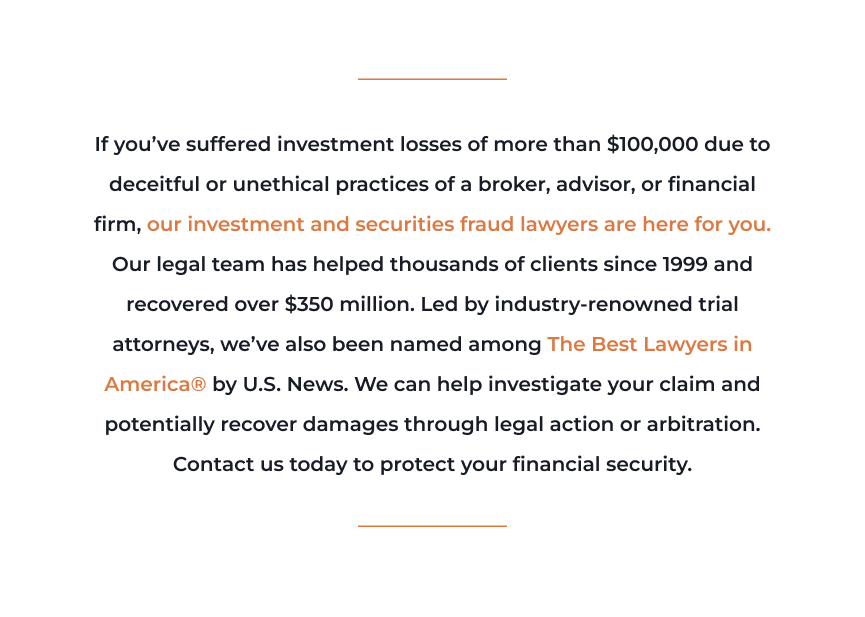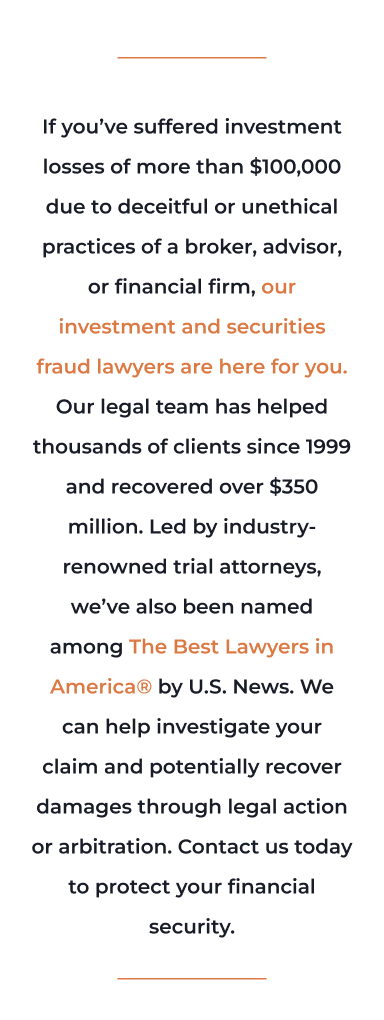
We’re here to help you navigate the complex world of investment fraud in North Carolina. If you suspect you’ve become a victim of investment fraud, it’s crucial to seek the guidance of a skilled North Carolina investment fraud lawyer.
Our team can assist you in identifying the signs of fraud, taking appropriate action, and recovering your losses. Don’t face this challenging situation alone – let us guide you towards justice and financial recovery.
Key Takeaways
- Types of investment fraud in North Carolina include Ponzi schemes, securities fraud, and affinity fraud.
- Signs of investment fraud to watch out for include promises of high returns, guaranteed profits, pressure to act quickly, lack of documentation, and unregistered investments.
- Hiring a North Carolina investment fraud lawyer is crucial to navigate the legal complexities, analyze the case, gather evidence, and build a strong legal strategy.
- Steps to take if you suspect investment fraud include gathering evidence, reporting to the appropriate authorities such as the North Carolina Secretary of State’s Securities Division, FINRA, or the SEC, and consulting with a lawyer for guidance and representation.
Types of Investment Fraud in North Carolina
In our experience as North Carolina investment fraud lawyers, we have encountered various types of investment fraud that have occurred in the state. It is important for individuals to be aware of these common investment scams and the legal consequences associated with investment fraud.
One common type of investment fraud is known as Ponzi schemes. These schemes involve the promise of high returns on investments, but instead of using the funds for legitimate investments, the fraudster uses the money from new investors to pay off earlier investors. Eventually, the scheme collapses when there are not enough new investors to sustain the payments, leaving many individuals with significant financial losses.
Another type of investment fraud is securities fraud, which involves the manipulation of the stock market or other securities markets. Fraudulent practices such as insider trading, false statements, or unauthorized trading can result in substantial financial harm to investors. Those found guilty of securities fraud may face severe penalties, including fines, imprisonment, and the loss of professional licenses.
Investment fraud can also take the form of affinity fraud, where fraudsters target specific groups, such as religious or ethnic communities, using trust and personal connections to deceive individuals into making investments. These scams can be particularly devastating as victims may be less likely to suspect fraud due to the shared affiliation.
The legal consequences of investment fraud can be severe. In addition to criminal charges, victims may also pursue civil litigation to recover their losses. It is crucial for individuals to be cautious and seek advice from reputable professionals before making any investment decisions to avoid falling victim to these fraudulent schemes.
By being informed and vigilant, individuals can protect themselves from common investment scams and the potential legal consequences that come with investment fraud.
Signs of Investment Fraud to Watch Out for
As North Carolina investment fraud lawyers, we have identified several signs of investment fraud that individuals should watch out for. Recognizing these red flags can help protect investors from falling victim to common scams. Here are some key indicators to be aware of:
| Signs of Investment Fraud | Common Scams |
|---|---|
| Promises of High Returns | Ponzi Schemes |
| Guaranteed Profits | Pyramid Schemes |
| Pressure to Act Quickly | Pump and Dump Schemes |
| Lack of Documentation | Advance Fee Frauds |
| Unregistered Investments | Affinity Fraud |
| Secretive or Complex Strategies | Insider Trading |
One of the most common signs of investment fraud is the promise of high returns. Scammers often entice investors with the allure of quick and substantial profits. They may claim to have a foolproof strategy or access to exclusive investment opportunities. However, these promises are often too good to be true and should raise a red flag.
Another red flag is when investments are guaranteed to make a profit. Legitimate investments always carry a certain level of risk, and no one can guarantee returns. If someone claims otherwise, it is likely a scam.
Investors should also be cautious of any pressure to act quickly. Scammers often create a sense of urgency to make investors feel like they will miss out on a great opportunity if they don’t act immediately. This tactic is commonly used in pump and dump schemes, where fraudsters artificially inflate the price of a stock before selling their shares and leaving investors with worthless stocks.
Furthermore, the lack of proper documentation is another warning sign. Reputable investment firms provide clear and transparent documentation, including prospectuses and offering materials. If an investment opportunity lacks these essential documents, it is best to steer clear.
Additionally, investors should be wary of unregistered investments. All legitimate investment opportunities and professionals must be registered with the appropriate regulatory bodies. If an investment is not properly registered, it is likely a scam.
Lastly, investors should be cautious of secretive or complex investment strategies. Fraudsters often use complex jargon and convoluted strategies to confuse investors and make it difficult for them to understand what they are investing in. This tactic is commonly used in insider trading cases, where fraudsters exploit non-public information to gain an unfair advantage in the market.
Why You Need a North Carolina Investment Fraud Lawyer
Why should we hire a North Carolina investment fraud lawyer? When it comes to protecting our investments and financial well-being, having a knowledgeable and experienced attorney by our side is crucial.
North Carolina has specific laws in place to combat investment fraud, making it essential to hire a lawyer who is well-versed in these regulations. The importance of hiring an investment fraud lawyer cannot be overstated, as they can provide invaluable guidance and representation throughout the legal process.
North Carolina investment fraud laws are designed to protect individuals from deceptive practices in the financial industry. These laws prohibit various fraudulent activities, such as Ponzi schemes, insider trading, and misrepresentation of investment opportunities. However, navigating the legal complexities of investment fraud cases can be challenging without the expertise of a lawyer who specializes in this area.
An investment fraud lawyer can thoroughly analyze our case, gather evidence, and build a strong legal strategy. They have the necessary knowledge and resources to identify red flags, uncover hidden assets, and determine liability. By leveraging their expertise, we can maximize our chances of recovering lost funds and holding the responsible parties accountable.
Furthermore, an investment fraud lawyer will advocate for our rights and best interests throughout the entire legal process. They will handle all communications with regulatory agencies, negotiate settlements, and, if necessary, represent us in court. Having a skilled lawyer on our side can alleviate the stress and burden of dealing with complex legal matters, allowing us to focus on rebuilding our financial future.
Steps to Take If You Suspect Investment Fraud
So, what should we do if we suspect investment fraud in North Carolina? Taking swift and appropriate action is crucial when it comes to protecting ourselves and others from financial scams. Here are the steps we can take to report investment fraud and help prevent further harm.
First and foremost, it is important to gather as much evidence as possible. Document any suspicious transactions, conversations, or interactions related to the investment in question. This evidence will be valuable when reporting the fraud to the appropriate authorities.
Next, contact the North Carolina Secretary of State’s Securities Division to report the suspected investment fraud. They are responsible for overseeing securities transactions and can provide guidance on the next steps to take. Additionally, consider reporting the fraud to the Financial Industry Regulatory Authority (FINRA) or the Securities and Exchange Commission (SEC), as they also play a role in regulating investment activities.
When reporting investment fraud, be prepared to provide detailed information about the suspected fraud, including the names of individuals or companies involved, dates of transactions, and any supporting documentation. The more information you can provide, the better equipped the authorities will be to investigate the matter.
It is important to be aware of common red flags of investment fraud. These can include promises of high returns with little or no risk, pressure to invest quickly, unsolicited investment offers, and unlicensed individuals or firms. If any of these red flags are present, exercise caution and conduct thorough research before making any investment decisions.
How a North Carolina Investment Fraud Lawyer Can Help You Recover Your Losses
After reporting investment fraud, we can turn to a North Carolina Investment Fraud Lawyer to help us recover our losses and navigate the legal process. These lawyers specialize in handling cases related to investment fraud and have the knowledge and expertise to assist victims in seeking compensation for their losses. Here are some ways a North Carolina Investment Fraud Lawyer can help you recover your losses:
- They will conduct a thorough investigation into the investment fraud case, gathering evidence and identifying any parties involved in the fraudulent activity. This may involve working closely with forensic accountants who can analyze financial records and uncover any discrepancies or signs of wrongdoing.
- A North Carolina Investment Fraud Lawyer will guide you through the legal process, explaining your rights and options. They will represent you in any negotiations or settlement discussions with the responsible parties, ensuring that your interests are protected.
- They will help you evaluate the strength of your case and determine the best course of action. This may include filing a lawsuit to seek compensation for your losses, or pursuing alternative dispute resolution methods such as mediation or arbitration.
- A North Carolina Investment Fraud Lawyer will also advise you on the importance of due diligence in avoiding investment fraud in the future. They can provide guidance on how to research and vet potential investment opportunities, helping you make informed decisions and minimize the risk of becoming a victim of fraud.
Frequently Asked Questions
How Long do I Have to File a Claim for Investment Fraud in North Carolina?
We have to file a claim for investment fraud in North Carolina within a specific deadline. It’s important to understand the legal process and seek guidance from a lawyer experienced in handling such cases.
Can I Recover My Investment Losses If the Fraudster Is Not Located in North Carolina?
We can still potentially recover investment losses outside of North Carolina if the fraudster is not located here. It is important to explore legal recourse options available to investment fraud victims outside of the state.
Are There Any Alternatives to Hiring a North Carolina Investment Fraud Lawyer?
There are alternatives to hiring a North Carolina investment fraud lawyer. We can research and gather evidence ourselves, file complaints with regulatory agencies, or seek assistance from nonprofit organizations specializing in investment fraud cases.
What Types of Compensation Can I Expect to Receive If I Win My Investment Fraud Case?
If we win our investment fraud case, we can expect to receive various types of compensation, such as monetary damages, restitution, and possibly even punitive damages, depending on the legal process and the specific circumstances of our case.
How Much does It Cost to Hire a North Carolina Investment Fraud Lawyer?
When considering the cost of hiring an investment fraud lawyer, it’s important to compare their fees and services. Factors to consider include their experience, reputation, and the complexity of your case.
Conclusion
In conclusion, if you suspect investment fraud in North Carolina, it is crucial to seek the help of a skilled and experienced investment fraud lawyer. They can guide you through the legal process, help you recover your losses, and hold the responsible parties accountable.
By taking swift action and working with a trusted professional, you can protect your rights and secure a better financial future.



